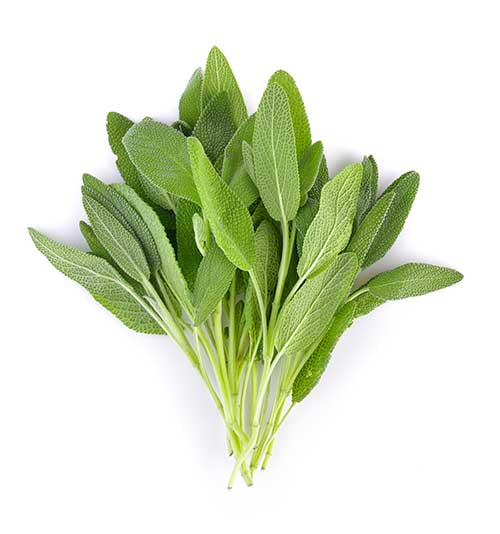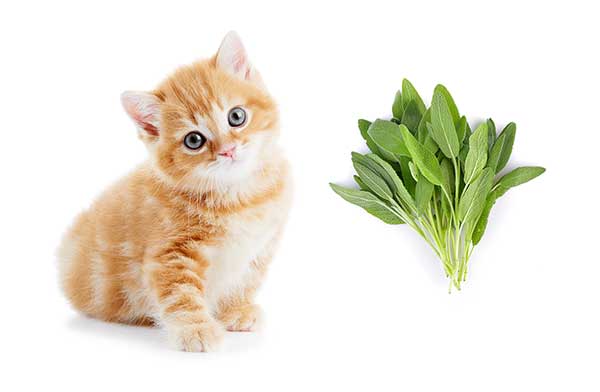One of the most frequently raised concerns by pet parents is – my cat ate sage! Will he be ok? As a responsible cat owner, it’s only natural to be nervous if you left the house and upon coming back, you discover that your cat has snacked on your sage plants. At such times, you may find yourself wondering, is sage safe for cats to eat?
The short answer is yes, sage is safe for cats and there shouldn’t be any immediate health concerns to worry about. According to experts, you don’t need to fret if you discover that your kitty has nibbled sage leaves or eaten food that’s enriched with this aromatic herb.
However, the fact that sage is safe for cats to eat doesn’t mean you should just allow your furry friend to devour the plant with careless abandon.
Remember that the digestive system of cats isn’t designed to handle plant matter. So, eating sage over and again might lead to severe gastrointestinal complications, such as vomiting, diarrhea, abdominal pain, and stomach upset.
Read on as we unpack the topic further by answering all the related questions on sage and cats.
Table of Contents
Can Cats Eat Sage? More About Sage
We’ve already highlighted that cats can eat sage, but with a caveat. So, you might be asking yourself, is sage toxic to cats?
Well, as we shall find later on, there are extreme cases when this aromatic culinary herb may turn toxic to your feline friend. Before that, let’s introduce the herb further so you can read on from a point of information.
Now, sage, scientifically known as Salvia officinalis, is a medicinal, ornamental, and culinary perennial, evergreen shrub.

Sage goes by numerous other names, including kitchen sage, broadleaf sage, golden sage, common sage, and culinary sage. The shrub is characterized by woody stems and grayish leaves, as well as flowers that range from blue to purplish.
Sage belongs to a family of plants known as Lamiaceae, which is popularly known as the mint family. The leaves of the sage plant can be used for medicinal and culinary purposes as they are, or processed into an essential oil first.
Is Sage Safe to Cats or Toxic? A Look Into the Potential Benefits
Sage comes with antiseptic, antispasmodic, astringent, and antihydrotic qualities. Your cat can benefit from the herb as follows;
1 – Antiseptic and antimicrobial properties protect your cat from bacterial infections, particularly, Salmonella and E. coli.
2 – Antispasmodic properties help to calm down your cat’s muscles, preventing unnecessary muscle twitching, body tremors, and seizures.
Along with its antispasmodic qualities, sage is also a vasodilator. That means it relaxes the muscles of your cat’s blood vessels, thereby promoting blood circulation and keeping your kitto’s heart healthy.
3 – The astringent properties of sage makes it a recommended herb for cats dealing with skin ulcerations. The herb can clean and rejuvenate your cat’s skin by tightening the pores and inhibiting the over-secretion of oil.

4 – Lastly, the antihydrotic abilities of sage makes it an excellent home remedy for cats that are facing excessive sweating. More particularly, those with hyperhidrosis.
Sage is also rich in dietary fiber and might help to relieve gastrointestinal complications in your cat, such as gassiness, constipation, and diarrhea. Plus, it comes with potent antifungal properties, making it effective at protecting your cat from fungal infections like ringworms.
There are plenty of other health and dietary benefits of sage. But does that make the plant entirely safe for cats? Is sage good for cats?
The following sections shall expound further on that.
How To Use Sage
After having examined the potential health benefits of sage for cats, the next area to tackle is how to use the herb. Traditionally, sage was used as a tea, ground and added to food, or administered as a tincture.
In the case of cats, you can either chop the leaves of the plant and add them directly to your cat’s regular or homemade snacks.
Or, you can give them a pinch of dried and grounded leaves. And that leads us to the question, are sage leaves safe for cats?
Yes, sage leaves are perfectly safe for cats, either fresh or dried.
There is also the question of the right method of administration, which essentially depends on the intended use.
Sage leaves and powder can be administered orally if you intend to treat conditions like indigestion or boost your kitto’s overall immunity.
You can also apply the extracts of sage leaves directly onto your cat’s skin to relieve itching and treat ulcerations.
Since sage is safe for both internal and external application, some cat owners may be wondering, is sage oil safe for cats?
No, sage oils are potentially toxic for cats. While you can freely use fresh or dried sage leaves on your cats, experts discourage sage essential oil as it contains ketones.
Excessive consumption of ketones may lead to a condition known as ketoacidosis. Ketoacidosis occurs when the levels of acid increase in your cat’s bloodstream. The condition is associated with feline diabetes.
Last update on 2024-07-10 / Affiliate links / Images from Amazon Product Advertising API
Various Forms of Sage
Sage comes in several forms, including dried leaves (also known as white sage), incense, and sage essential oil (also known as clary sage). Each of these forms reacts differently to your cat’s body.
Is white sage safe for cats?
White sage is essentially the dried leaves of the sage plant. And as we’ve already highlighted, they are both safe and beneficial to your cat.
However, dried sage leaves are only beneficial to your cat to the extent that you ground them and administer the powder as is. As you shall find, the equation changes suddenly if the dried leaves are burnt.
Cats And Burning Sage – Is Burning Sage Okay For Cats?
The burning of sage takes place in two ways. First, sage oil can be placed on a diffuser or burner and then heated.
Alternatively, the leaves and incense can be lit directly to produce smoke. Either way, burning sage delivers immense therapeutic effects to humans. But can the same be said about our feline friends?
Let’s find out by answering a series of questions on the safety of burning sage for cats.

Is burning sage safe for cats?
Burning sage is a ritual that has been practiced from time immemorial.
Some of the health benefits associated with burning sage include boosting cognition, soothing stress, elevating the mood and energy levels, and relieving insomnia.
It’s important to remember that there are limited scientific research findings suggesting that burning sage can benefit cats. Most of the health benefits stated here almost exclusively apply to humans. However, burning sage isn’t dangerous to felines either. The only thing you should take care of is the smoke.
Is sage smoke safe for cats or are cats allergic to sage smoke?
Yes, the smoke produced when burning sage leaves may irritate your cat’s respiratory system.
Cats with pre-existing respiratory conditions, such as asthma and bronchitis, may suffer even more from inhaling smoke. So, is sage smoke bad for cats? Unfortunately, it is.
Is sage incense safe for cats?
Just as we’ve mentioned, sage incense is safe for cats. Just ensure you don’t expose your cat to too much smoke.
Is diffusing clary sage safe for cats?
Clary sage is basically sage essential oil, and contains ketones that could be toxic to your cat.
Is sage spray safe for cats?
Sage spray is generally unsafe for cats because much of the spray is harnessed from the ketone-laden sage essential oil.
Lastly, it’s worth noting that sage can also be named depending on the region it’s indigenous in and its aromatic properties. In that regard, we have Russian sage, Texas sage, pineapple sage, etc.
So, is pineapple sage safe for cats? What about Russian sage, is Russian sage safe for cats? And is Texas sage safe for cats too?
All variants are safe for cats provided you use the fresh or dried and ground leaves of the plant.
Conclusion
Sage is one of the most beneficial plants for cats. It comes with a cocktail of health and dietary properties.
However, always give your cat the fresh or dried leaves of sage as opposed to sage essential oil. Also, while burning sage is perfectly fine for cats, avoid exposing your cat to too much sage smoke.
Checkout Our Favorite Cat Products
1. Best Online Course For Cat Parents
Our favorite: The Cat Language Bible (How to Finally Understand And Speak to Your Cat) – A new form of cat to human communication that many cat owners have dreamed about… but few have actually thought possible.
2. Best Immune Support For Cats
Our favorite: Tomlyn Immune Support – Best Supplement for Cats and Kittens.
3. Best Cat Treats
Our favorites: LIFE ESSENTIALS All Natural Freeze Dried Chicken And Sheba Meaty Tender Sticks – Both are Great.






